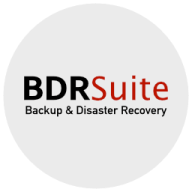

BDRSuite Backup & Replication and NetApp Cloud Backup are leading solutions in the data backup and replication sector. NetApp Cloud Backup seems to have the upper hand due to its advanced features and robust cloud integration, although BDRSuite is favored for its cost-effectiveness and support.
Features: BDRSuite is praised for its comprehensive backup options, ease of use, and reliable customer support. NetApp Cloud Backup shines with advanced data management capabilities, robust cloud integration, and extensive cloud support.
Room for Improvement: BDRSuite users suggest improvements in scalability, integration with third-party tools, and enhanced connectivity features. NetApp Cloud Backup feedback highlights a desire for better user guides, enhanced connectivity features, and improved customer support documentation.
Ease of Deployment and Customer Service: BDRSuite is appreciated for its straightforward deployment and reliable customer support. NetApp Cloud Backup receives similar praise for deployment ease but has mixed reviews regarding customer service responsiveness.
Pricing and ROI: BDRSuite is valued for its cost-effectiveness and quick ROI. NetApp Cloud Backup, while more expensive, is seen as providing good value due to its powerful features.
Not needing technical support is even better than good technical support.
There could always be little things that could still be fixed or improved for stability.
The features I find most valuable are ease of backup, ease of restore, the full restore, just getting some data out of a backup server or even the applications that are in the server, going through the database or going to Exchange.
| Product | Market Share (%) |
|---|---|
| BDRSuite Backup & Replication | 0.6% |
| NetApp Cloud Backup | 0.5% |
| Other | 98.9% |


| Company Size | Count |
|---|---|
| Small Business | 44 |
| Midsize Enterprise | 15 |
| Large Enterprise | 10 |
BDRSuite by Vembu offers comprehensive and cost-effective Backup and Disaster Recovery software tailored to meet the diverse data protection requirements of Businesses and Service Providers. BDRSuite provides robust backup solutions for a wide range of IT workloads, including virtual machines, servers, endpoints, SaaS applications, cloud VMs, NAS/File Shares, and databases & applications. It offers the flexibility to store backups anywhere and centrally manage the entire backup infrastructure.
BDRSuite is designed to help businesses keep their data secure and ensure it is easily recoverable in the event of data loss or ransomware attacks. With BDRSuite, businesses can achieve reliable data protection and ensure business continuity – all at an affordable price.
Download BDRSuite's 30-day Free Trial Here.
PRICING DETAILS
VMs, Servers & Cloud Backup at $48 per workload/year (VMware, Hyper-V, KVM, oVirt, Proxmox, Windows, Linux, AWS, Azure, File Share-500 GB)
Endpoint/Workstation Backup at $12 per endpoint/year (Windows, Linux, Mac)
SaaS Backup at $12 per user/year (Microsoft 365, Google Workspace)
DBs & Applications Backup at $72 per application/year (SQL Server, PostgreSQL, MySQL, Microsoft Exchange Server, SharePoint Server)
NetApp Cloud Backup is a fully integrated service for cloud backup and restoration. It was created to comply fully with NetApp's native data management software ONTAP, used for hybrid cloud experience. NetApp Cloud Backup is used to create backup and restoration for the protection and archiving of data, databases, and virtual machines related to the Cloud and On-Premises data in ONTAP. The way NetApp Cloud Backup works is by automatically creating block-level incremental backups. This ensures that the created backups are very fast and easy to restore. It is suitable for data protection regarding on-premises software as well as in the public cloud. NetApp Cloud Backup provides users with the ability to protect their cloud data at affordable prices and with a user-friendly interface so they don't need a lot of technical knowledge to be able to secure their cloud storage.
The copies created by NetApp Cloud Backup can be stored in the user's personal object storage in the cloud as well as on premises with StorageGRID - NetApp's storage platform. The backup copies can be restored to the original source or to a different source in Cloud Volumes ONTAP. NetApp Cloud Backup provides backups to AWS, Azure, and Google Cloud.
The features NetApp Cloud Backup provides include:
In addition to enhanced security and protection from malicious attacks, the advantages of using NetApp Cloud Backup include:
Abbasi P., a User at a financial services firm, likes that NetApp Cloud Backup is a completely agentless solution.
A Service Manager at a tech services company values its stability, scalability, and good technical support.
We monitor all Backup and Recovery reviews to prevent fraudulent reviews and keep review quality high. We do not post reviews by company employees or direct competitors. We validate each review for authenticity via cross-reference with LinkedIn, and personal follow-up with the reviewer when necessary.